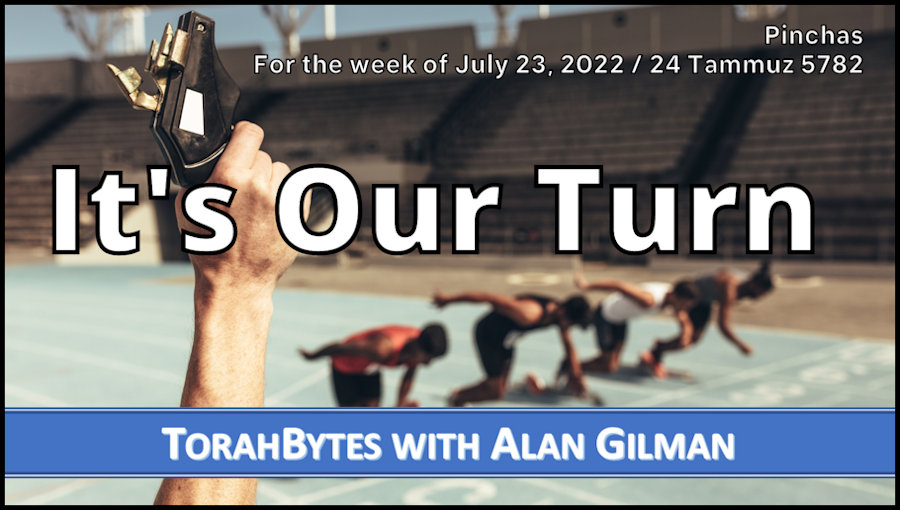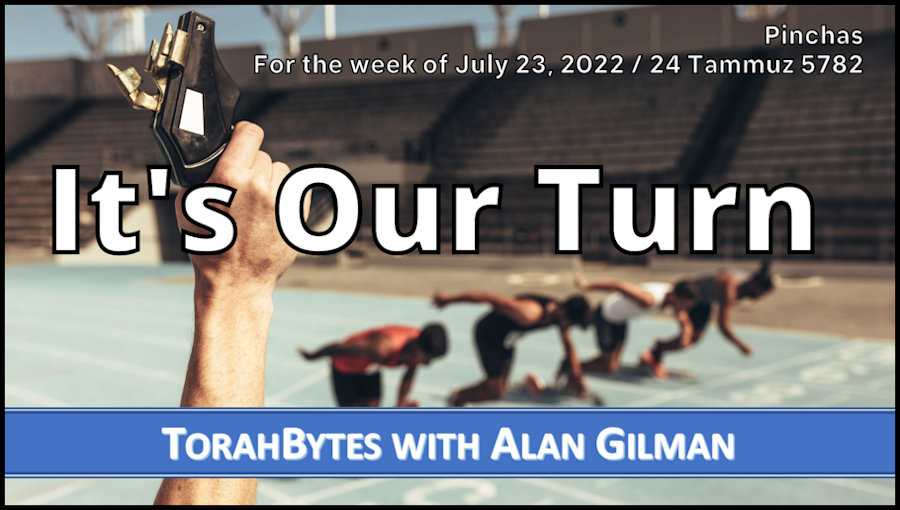
It’s Our Turn
For the week of July 23, 2022 / 24 Tammuz 5782

Pinchas
Torah: B’midbar/Numbers 25:10-30:1 (English: 25:10 – 29:40)
Haftarah: Jeremiah 1:1 – 2:3
Updated version of message from the week of June 29, 2013 / 21 Tammuz 5773
Download Audio [Right click link to download]
These were those listed by Moses and Eleazar the priest, who listed the people of Israel in the plains of Moab by the Jordan at Jericho. But among these there was not one of those listed by Moses and Aaron the priest, who had listed the people of Israel in the wilderness of Sinai. For the LORD had said of them, “They shall die in the wilderness.” Not one of them was left, except Caleb the son of Jephunneh and Joshua the son of Nun. (B’midbar/Numbers 26:63-65)
This week’s Torah portion includes the second census of the people of Israel taken almost forty years after the previous one. The adults listed in this latter census included no one from the first, except Caleb and Joshua. All the other adults, except for Moses who was nearing the end of his life, died out as the consequence of their failure to trust God regarding taking the Promised Land.
The earlier generation blew it. After seeing all that God had done in powerfully delivering them from slavery in Egypt, caring for and protecting them afterward, and giving them the Torah at Mount Sinai, they couldn’t handle the challenge of facing the powerful nations who inhabited the Land of Canaan despite God’s promise to give them overwhelming victory. They couldn’t connect God’s work on their behalf in the past with what God called them to face in the future. Their lack of faith disqualified them from receiving the land promised to their forefathers Abraham, Isaac, and Jacob.
Now a new generation would face the same challenge. The failure of their parents didn’t cancel out God’s promise of the Land, only postponed it. Not much had changed in forty years, just the personnel. The nature of the task was the same. There is no indication that the inhabitants of Canaan were any less antagonistic or less able to withstand the Israelite invasion. I don’t think we are told anywhere how or why they possessed an outlook their forebears did not. The new generation may have been more experienced than their elders, but experience alone doesn’t produce faith. They were also more removed from the effects of oppressive servitude. Yet freedom can make people more self-focused, not more submissive to God. But submissive faithful hearts they had, and while they too would have significant issues with respect to trusting God, they fundamentally stayed true to him and successfully settled the Land.
It would be difficult to underestimate the effects our ancestors have upon our lives. From genetics to behavioral patterns, from loyalty to afflictions, our family of origin is probably the single greatest factor determining who we are. I am very aware of how my childhood affected me. It would be so easy for me to blame my life struggles on my parents. But God doesn’t allow me the luxury of blame shifting. My parents had their challenges. Now it is my turn. This week’s passage shows me that I don’t have to let the outcome of my life resemble that of my parents or any of my ancestors.
At the same time, I know this is easier said than done. I don’t believe the Hollywood adage “you can do anything you set your mind to.” Life doesn’t work that way. I prefer the biblical principle: we can do anything God wants us to do. With God’s help we can overcome any difficulty. Our background need not define who we are or what we do. Each and every generation has the opportunity to hear what the Master of the Universe is saying to us and do his will. Whatever may have happened in the past, it’s now our turn.
Scriptures taken from the English Standard Version